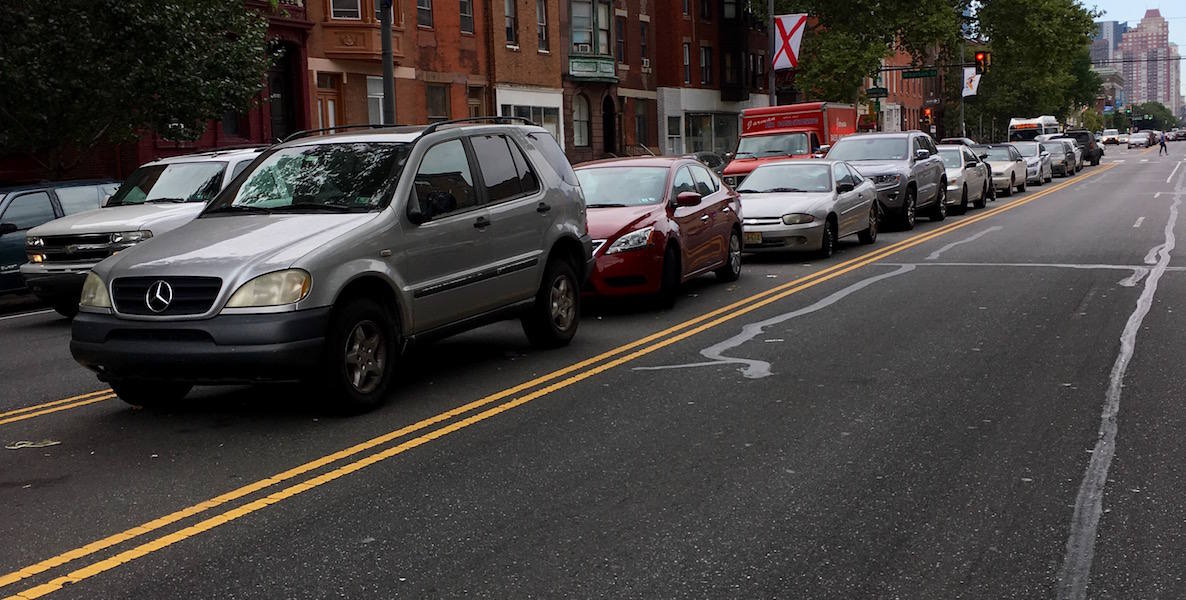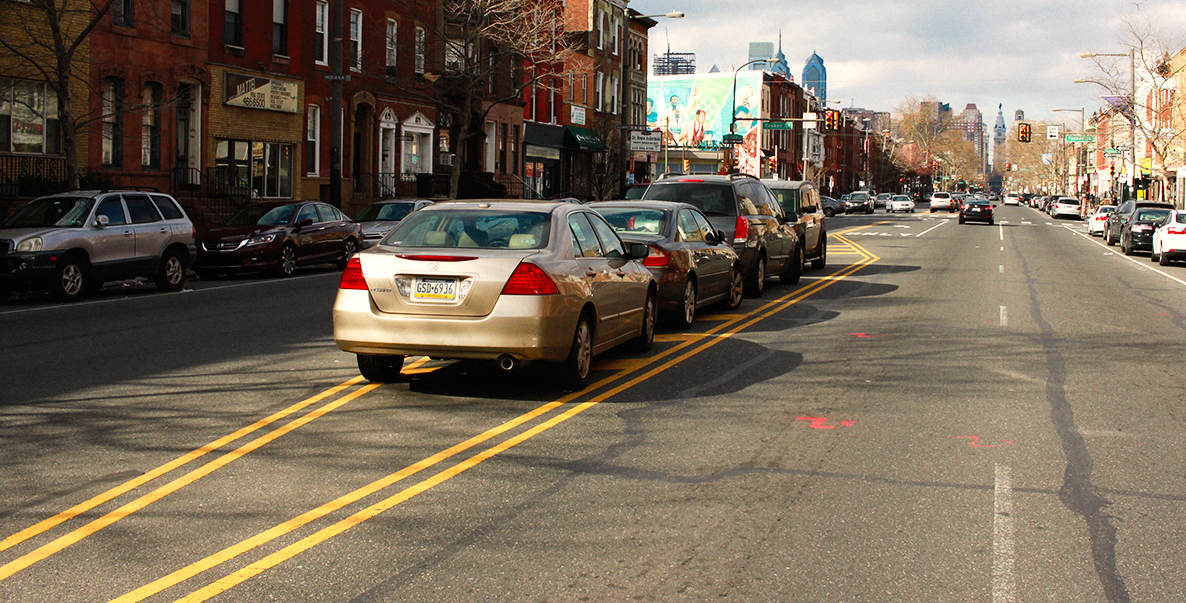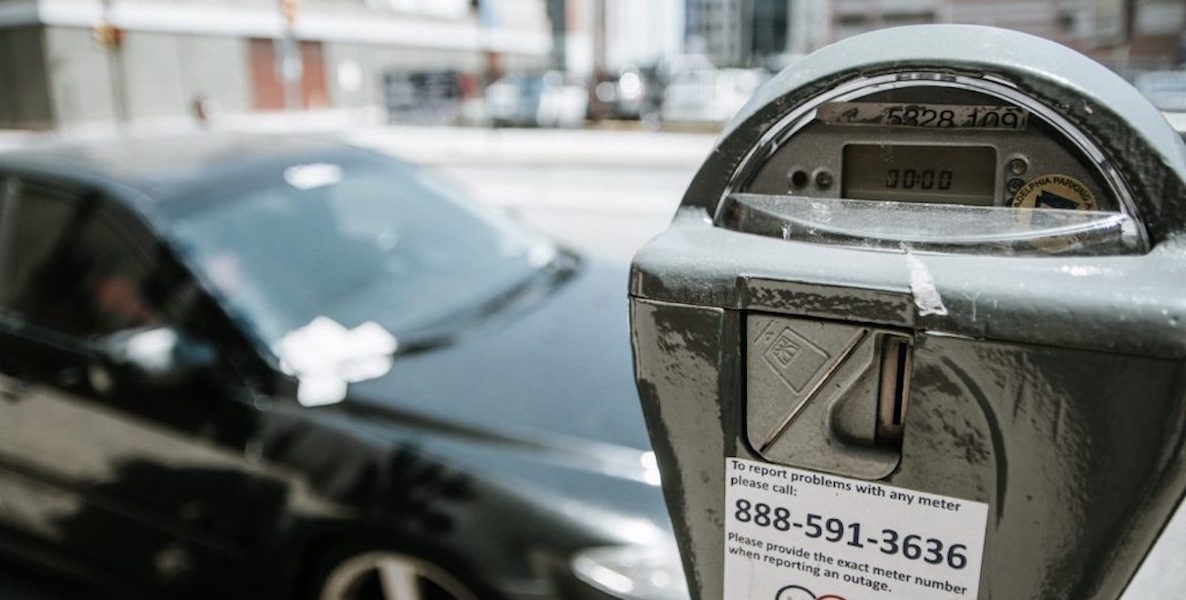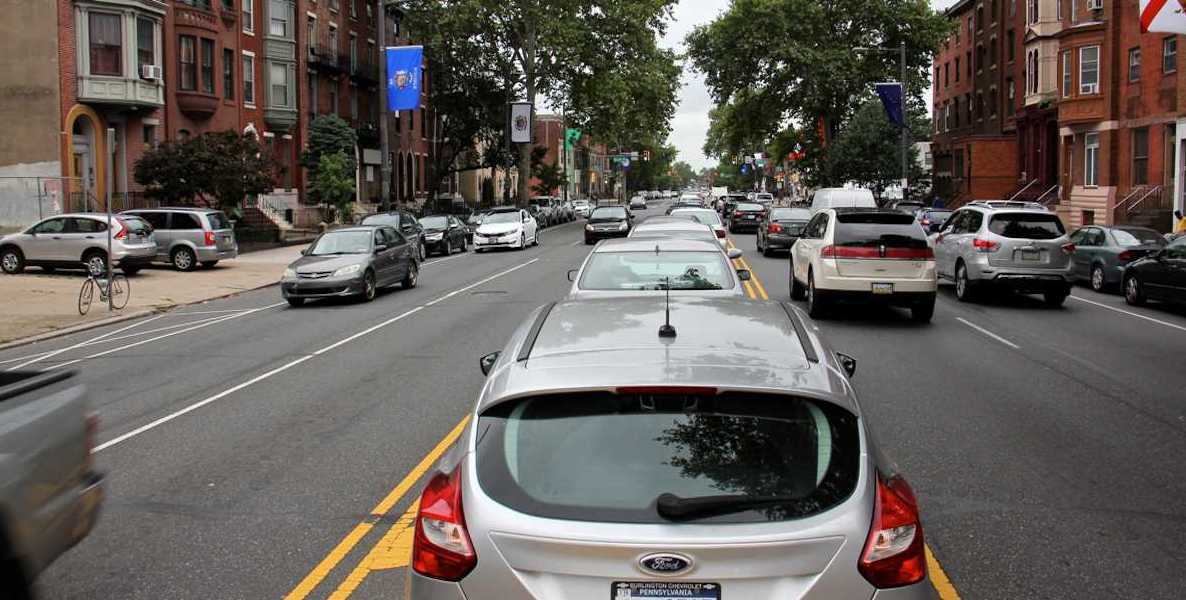Let’s just start out by acknowledging that South Philadelphia has…quirks. And they are quirks that cannot really be explained to anyone born north of Washington Ave. Trees? No, thank you all the same. Watering down the sidewalk? Sure!
But there is one quirk, one special something, that raises hackles and boils the blood like no other. I talk, of course, of parking on the South Broad Street median. Parking on the median is something as dear to South Philadelphians as their Mummers, their Broad Street Bullies, their stake in the Genos v Pats showdown.
So when 5th Square PAC filed a lawsuit last week demanding the city end the age-old tradition, it unsurprisingly ruffled a lot of feathers. In response to the suit, three local groups— Taking Our South Philadelphia Streets Back, Philadelphia Block By Block and Citizens for Better Philadelphia—are calling on the city to officially legalize median parking, and have garnered over 1,000 names on a petition.
For anyone just joining us, “parking on the South Broad Street median” is many things: It’s a free parking lot, providing 200 spots between Shunk Street and Washington Avenue, for those bold enough to grab one. It’s illegal, though it has never really been enforced. It’s something that only happens in South Philly, and literally nowhere else on America’s longest street. And, according to 5th Square’s Jake Liefer, it’s a hazard to bikers and pedestrians alike. (More on that later.)
It’s clearly something about which South Philadelphians are divided. Last year, The Citizen conducted the only poll specifically targeting local residents, and found them pretty evenly split on the matter of parking in the middle of Broad Street. (Disclosure: I am one of those residents who lives near Broad Street.)
And there’s something Liefer and his critics can agree on: The city should be doing more to solve the parking conundrum in growing neighborhoods around Philly. “The PPA and the city are turning their back on finding a parking solution,” Liefer says. “There’s been a parking crunch for some time. The PPA is a quarter of a billion dollar agency, and have yet to come up with a comprehensive parking plan.”
There’s been a lot of tough talk over this issue for the last year, which has gotten us basically nowhere. Here, an attempt to provide some perspective:
- This may not be about safety at all. There is no real evidence that parking in the median actually makes biking or walking less safe than biking or walking on other parts of Broad Street, despite what 5th Square says in its lawsuit. The filing notes that all the pedestrian deaths on South Broad for the last eight years have occurred south of Washington Avenue, though that’s not necessarily just in the blocks that have median parking. As Joe LiTrenta of Philadelphia Block by Block noted in a philly.com op-ed, “correlation does not equal causation.” Liefer himself acknowledges that he has no hard numbers to back up the claim; he says he’ll look for those in discovery from the lawsuit, but that in the meantime, it just makes sense to assume it’s less safe. That reasoning seems thin; it also seems a little besides the exact point to Liefer. “Overall, this is indicative of larger issues, where the city has failed to prioritize issues,” he says. “It’s a microcosm of the problem: If we’re talking about zero fatalities, we’re not going to get there by turning a blind eye to illegal and unsafe practices.”
- Enough with the complaints—bikes are good for the city. What’s more, they’re here to stay—and not because of urban hipsters who are ruining your city with eco-forward ideas like trees and car-free weekends. The highest-percentage of bike riders are immigrants and people with lower-income, who use bikes as a cheap, fast and easy way to commute to their jobs. Making their life easier, and safer, seems like a good thing. Oh yeah, and: Biking is better for the environment than driving. Full stop.
- But don’t be so quick to demand people give up their cars. As a Center City District report noted last year, 39 percent of city residents reverse commute to jobs in the suburbs, often to places that are not easily accessible via public transportation. In South Philly, while the number of bike commuters is above average, cars are still the most common form of commuting, according to a Planning Commission report. Real change to the car situation requires the hard work of creating more jobs, and better transportation options for all Philadelphians.
- There is no right to parking in the city charter. South Philly residents, whether longtimers or newcomers, are not owed parking spots in the middle of Broad Street—or anywhere, for that matter. And they are certainly not owed multiple spots per household—like one of my neighbors who argues for median parking so that he has room for his four construction vehicles. (Which is what, like six regular spots?) I get that doing business in Philly can already be onerous, but if we’re worried about enough parking for residents, perhaps it’s businesses with multiple vehicles that could be made to park elsewhere.
- This is why people hate gentrifiers. A much-talked about Pew report from last year made what to many people was a surprising conclusion: Only 15 neighborhoods—or 4 percent—experienced what the researchers considered economic “gentrification.” On the flip side, 10 times as many neighborhoods experienced a drop in median income. Those 15 gentrifying areas are generally where you’d expect them to be—in Graduate Hospital, lower north river wards…and East Passyunk, a part of South Philly near Broad Street.
Gentrification doesn’t have to be bad for anyone. Everyone should be able to benefit when crime goes down, property value goes up, and retail returns. In fact, the Pew report calls out East Passyunk as an example of a neighborhood where gentrification has happened more gently. Partly, that’s a race thing: Both old and new residents are primarily white, and are not displacing African Americans. And with little vacant land, they are not disrupting the landscape, either. But this parking clash is exactly the sort of cultural disconnect that is the ugly side of neighborhood growth.
Point Breeze, directly across Broad from East Passyunk, did not quite make Pew’s definition of gentrification, but was mentioned in it as the epitome of tension: This is where developer Ori Feibush and City Councilman Kenyatta Johnson continue to spar over development; where a group of new residents fueled the fire by deciding to rename their neighborhood “Newbold;” and where Liefer happens to live. Even in East Passyunk, you have the Passyunk Post, which bills itself as “For the new South Philly.” (Emphasis added.)
As if they’re saying, new is better, new knows better. Perhaps it would behoove more recent residents to learn from the mistakes of early Friends of schools groups, which found they got much more done, and made many more improvements, by working with the families that were already there, rather than coming in and telling them what was needed.
- Can everybody please calm down? I’m glad there are passionate advocates about urban issues. But this is, after all, about parking for a relatively few cars in a very few blocks of the city; it’s not about schools that fail students, or the killing of young black men (usually by each other), or the fact that a quarter of our population lives in poverty. Parking in South Philly need not lead to pepper spray attacks, as it did one late night in July. And it need not engender threats of a MOVE-like fire bombing or of coming after him with baseball bats, as Liefer experienced when he first brought this issue up last year. If anything, we should be applauding him for a pretty significant amount of civic courage to be pushing this issue while at the same time living in the neighborhood. (He says that no one seems to recognize him as being behind the lawsuit.)
- Can I get a solution, please? Liefer is right that the PPA and the city have failed to figure this issue out for some 100 years, and they should do a better job. But before we go applauding him too hard for his civic engagement, consider that 5th Square’s ultimate goal is to eliminate parking in the Broad Street median, and…that’s it. Liefer has suggested folks park at the indoor lot at Broad and McKean, which costs a paltry $3 a night (but still $1,095 a year). But 5th Square has otherwise decided they don’t need to be part of figuring out the answer to the neighborhood’s big parking problem. “From our perspective, we don’t have to come up with solutions,” Liefer says. “If someone’s graffitiing my house, I don’t have to come up with solutions, or figure out how to give them something else. I just want it to stop.”
Is that really enough though? We need real parking reform in this city, which means we need real conversations about alternatives to the status quo. In Queen Village, for example, the civic association leases land under I-95 that it turned into a relatively cheap parking lot that also generates millions of dollars for the neighborhood. Maybe the city could do the same for East Passyunk, giving over its municipal lot at Passyunk and Morris to the neighborhood group. Maybe we need a sort of “cap and trade” system, like Philly 3.0’s Jon Geeting recently proposed. Maybe we need to charge even more for parking permits, to make multiple car ownership less palatable. Maybe we need to figure out how to get people jobs nearer to their homes.
Clearly that is a harder discussion than a simple yea or nay on the Broad Street median. But that’s the kind of conversation I’d like to hear my neighbors having.
Header Photo: Emma Lee






